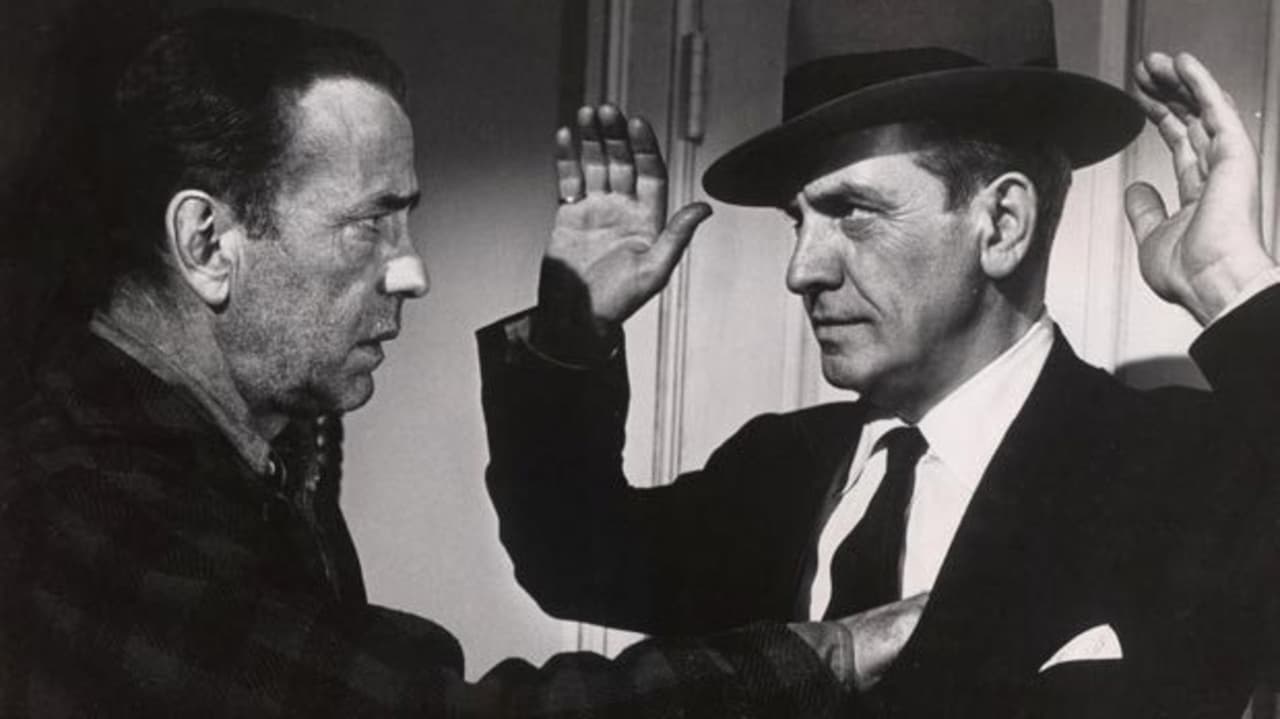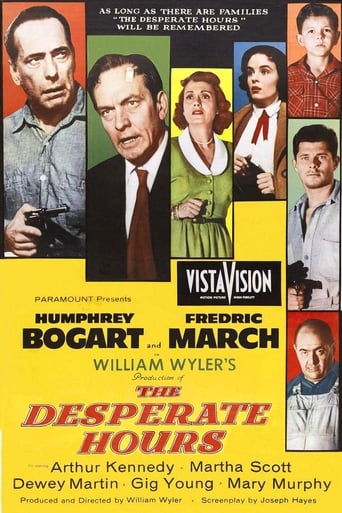



Perfectly adorable
Disappointment for a huge fan!
It's fun, it's light, [but] it has a hard time when its tries to get heavy.
View MoreThe thing I enjoyed most about the film is the fact that it doesn't shy away from being a super-sized-cliche;
View MoreThere are few plays or musicals from the Broadway stage that end up becoming a Hollywood film the very same year, but one of those rare examples is the Tony Award winning play "The Desperate Hours" which spawned several imitations on film the very same year, most obviously "The Night Holds Terror". But as well done as the imitator was, it is the original that deserves praise, giving Humphrey Bogart his most sinister sociopathic criminal since "The Petrified Forest" and giving fellow Oscar Winning actor Frederic March an equally good role to sink his teeth into as the patriarch of the family whom escaped convicts Bogart and his gang terrorize. Martha Scott, an underrated actress of stage, screen and TV, best known for character parts (in spite of a leading lady career of such classics as the original film version of "Our Town" and "Cheers For Miss Bishop") plays his terrified, but ultimately brave wife, determined to do everything she can to protect teenaged daughter Murphy and precocious pre-teen son Richard Eyer. She even risks her own life at one point in a powerful scene where her frustration takes over her common sense.Bogart's fellow escapees include his younger brother (Dewey Martin) and the coarse Robert Middleton, a large human monster who seems to take glee in the terror he poses on his victims, and in one of the more horrific scenes, drives an innocent elderly junk man to a presumed death. The terror on the junk man's face is powerful, briefly overcome by the determination to survive, and from that moment on, the audience is in the grips of the desire to see Middleton's character disposed of in the most violent of ways. Martin is a bit more sympathetic and gentle than his brother and Middleton, at one point stopping Middleton from attacking the attractive Murphy. But he's as much in this as the other two escapees, so his fate is sealed as far as the audience's desire is concerned. Bogart is the smartest of the trio, utilizing every precaution to ensure their survival, and suspicious of every little move that the family they are holding hostage (while still allowing them to go through their outside daily routines with the knowledge that housewife Scott will be in peril if anything should arise) to the point of even checking out Eyer's homework project just on the suspicion that he should be trying to alert his teacher to their situation.The always outstanding March delivers another fierce performance, at one point telling his concerned secretary (Helen Kleeb) to mind her own business when she expresses concern over his apparent nervousness. Murphy's boyfriend (Gig Young) becomes concerned over her sudden distance, even on a date, while a local cop (Arthur Kennedy) who was involved in Bogart's initial arrest, nervously fidgets during these desperate hours with the knowledge that Bogart will be coming after him for Kennedy's having struck and scarred Bogart with the butt of his gun when arresting him. The little details all add up to make a truly intense hour and a half of gripping terror that showed society at its worst. The fact that this is an apparently true story makes it all the more suspenseful, brilliantly written for the screen by its own playwright Joseph Hayes and superbly directed by the legendary William Wyler. Pretty much everything about this film is outstanding. I originally saw this as a double bill with the same year's "We're No Angels" (also from Paramount) where Bogart played a more comical prison escapee who hides out in the home of store owners unaware of whom they are playing host to. The common denominator between the two films of the lives of escaped convicts has stood the test of time with me, so it is difficult to think of one film without thinking of the other.
View More. . . or a polemic against America's militarized police? THE DESPERATE HOURS end thanks to Dan's revolver being registered when it's found near Hal. They also end because as far back as 1955 (when DESPERATE came out) American cops could ape the East German border guards at the Berlin Wall at the drop of a hat. Within minutes any neighborhood in the U.S. could be cordoned off and turned into a killing box, complete with Kleig lights, snipers, and machine guns. I just heard on the news today about a 95-year-old WWII hero being gunned down in his nursing home this week by a trigger-happy cop. Since HE wasn't safe, NONE of us are. One of the doomed men in THE DESPERATE HOURS is mentally retarded, and mostly wants to play with toys. Another just desires a girl; the third, a cigar. It's not hard to sympathize with this hapless have-not trio. I read that if the names of all the Americans rubbed out by the police who "protect and serve" us were inscribed somewhere, that memorial would have to be nearly SIX times as big as the Vietnam War Wall, and the needed size expands daily. Many of these snuffed names would be those of "surviving" Vietnam War heroes. So it goes.
View MoreWe were all rooting for Mr Hilliard and his family. A group of friends in 2014 crowded round a TV hoping 'desperately' that Mr Hilliard in 1953 could save himself and his family from the filthy and murderous criminals who had invaded their lovely sanctuary of a home. What made this such a fantastically gripping and emotional tale? The cast, the story, the cinematography? Or our modern, 'desperate' need for decency to prevail ? Yes, as we are nightly beleaguered by tales of international atrocities we must believe that the ordinary, decent (American and by extension 'civilised') family can always prevail against the forces of evil criminality. A fabulous film, totally gripping. A glimpse into awfulness redeemed by decency and courage. We love Mr. Hilliard!
View MoreFrederic March, Martha Scott, Humphrey Bogart and Arthur Kennedy are just a few of the people who endure "The Desperate Hours," a 1955 film, based on the stage play and directed by William Wyler. On Broadway, the play was directed by Robert Montgomery and starred Karl Malden in the Bogart role and Paul Newman played his brother, here played by Dewey Martin. The film also stars Gig Young, Mary Murphy, Richard Eyer, and Robert Middleton.Having just seen Bogart in the 1936 "The Petrified Forest," it was interesting to see him still taking hostages 19 years later - and in fact, looking like he'd spent the last 19 years on the run from the law. He was clearly ill during the making of this film. Though Dewey Martin looked 30 years younger than Bogie, he was in fact only 20, making the fact that they were brothers a tiny bit more plausible.I also had recently seen "The Star Witness," a 1931 Warner Brothers film with a similar plot, which won an Oscar for best original screenplay. By 1955, it wasn't original any longer, but the execution of the story is compelling. Martha Scott is a housewife, Ellie Hilliard, alone in her suburban home when three escaped criminals (Bogart, Martin and Middleton) take over the place. Glenn Griffin (Bogart) wants to murder the Deputy Sheriff (Arthur Kennedy) who put him in prison, and he needs to wait for the delivery of some money to make good his escape. Dan Hilliard (March) and his daughter Cynthia (Murphy) walk into the situation, followed later by the Hilliard's little boy (Eyer). You'll be wondering why the son isn't knocked off - by his parents - given the trouble he causes.The money is delayed, and of course, the police have no idea where the gang is, as Griffin has put his car in the Hilliard garage. So the hours turn into overnight. Although March and Cynthia are allowed to leave the house for work, and Cynthia has to keep a date with her boyfriend (Young), they're too terrified to say anything for fear the mother and boy will be killed. Basically the gang as well and the family become prisoners as the hours drag on.Wyler gives us lots of frightening and suspenseful moments as the tension builds in the house, and he never lets the pace drag. Supposedly he made March and Scott do a goodbye scene for take after take because he thought March was "acting" and wanted to tire him out. An accomplished stage actor of the old school, March consistently had a great presence but didn't always emotionally connect with his characters - he does here. March and Bogart make powerful adversaries, March hitting just the right note as an angry father afraid for his family, but not afraid to talk back to Griffin. Bogart's Griffin is shrewd and admires brains and bravery in others; the family impresses him with their guts.Bogart is marvelous in the role - though tired out, his character is determined to keep the gang together and free; he's resentful of the middle classness of the family and how out of place he and his gang are in a nice home. Unlike his Duke Mantee in "The Petrified Forest", Bogart's Griffin doesn't seem to have a sense of the hopelessness of his situation until the very end; also unlike Duke Mantee, he has a vulnerability that he demonstrates at the end.Robert Middleton gives a scary performance as a witless member of the gang, and Martin, as Hal, displays Hal's disillusionment with the situation, his attraction to Cynthia, and the realization that he can never have someone like her if he continues down his brother's road. Gig Young is somewhat wasted as Cythia's boyfriend - it's unnecessary star casting. Martha Scott does a terrific job as the harried wife and mother. The wonderful Arthur Kennedy gives another good performance as the sheriff determined to catch Griffin.Highly recommended for its suspenseful story, fine direction, and top performances.
View More